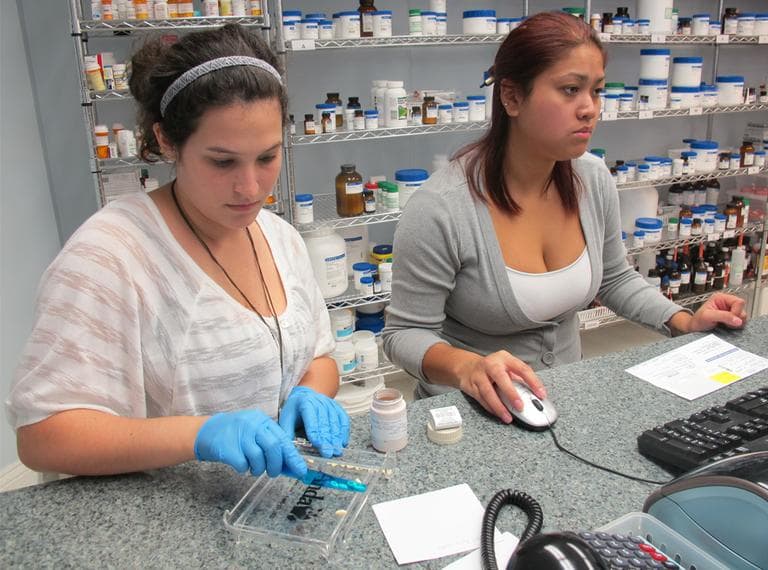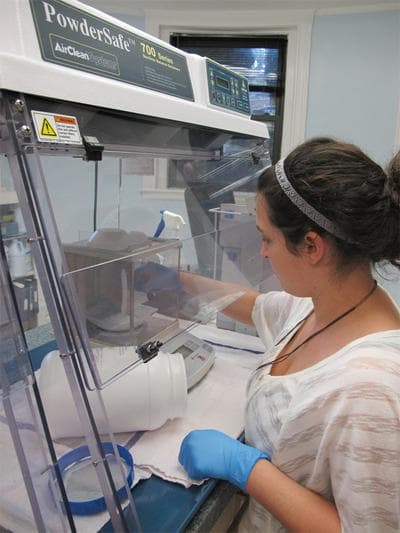Advertisement
Mass. Pharmacy Industry Resists Call For Stricter Regulation
Resume
A second compounding pharmacy in Massachusetts has agreed to temporarily shut down. Ameridose of Westborough is run by the same executives who run the Framingham company that produced the steroid linked to a deadly outbreak of fungal meningitis. More than 130 people in 11 states have been sickened. Twelve have died. But unlike New England Compounding Center, Ameridose is not issuing recalls while regulators inspect its facility.
The investigation into the mounting death toll linked to NECC is prompting many to call for greater regulation of such compounding pharmacies. Still, many in the industry say that will likely only make things worse.
Smaller Pharmacies Forced To Adapt
Ever since the news broke that a compounding pharmacy in Massachusetts was been linked to a growing roster of dead patients, Greg Laham has been upset.
"It’s really a shame," Laham said. "It’s a horrible thing."
Laham is the owner of a different compounding pharmacy, one of dozens around the state, Sullivan’s in Roslindale. The store opened the year Fenway Park did — 100 years ago.
"Mr. Sullivan started the business in 1912. There’s been three owners," Laham said. "He, another owner, and then myself. I’ve been here 35 years."
Under his watch, Laham has seen the pharmacy business change big time. For one, the rise of chain stores like CVS. Laham says mom-and-pop pharmacies could no longer compete on price, so they had to adapt.
"That’s the key. I mean, no matter what I sell Tylenol for, someone’s gonna be selling it cheaper," Laham said. "We can’t even buy it at the price some people are selling it. So that’s not what we’re looking for. We’re looking for a lot of services that pharmacies didn’t provide before."
Those services include medical supplies like wheelchairs and oxygen tanks. Deliveries to nursing homes. And compounding. That’s where you take custom orders from doctors to break down manufactured drugs for specialty applications. Pills that are easier to swallow. Smaller doses for kids. And not just for children. Laham says one of the fastest growing parts of his business is compounding for veterinary clinics.
"You know, you got a dog and you try to put a pill in its mouth and it spits it out," Laham said. "We make it beef flavored or liver flavored or whatever, and it makes it much easier for them."
Massachusetts law requires every pharmacy to do some basic compounding, such as mixing eye drops and ointments. But Sullivan’s and a few dozen others around the state have specialized in compounding as a way to grow and diversify. Laham just spent $250,000 renovating his pharmacy. This mom-and-pop shop now employs 100 people in Roslindale Village.
A Regulatory 'Black Hole'
U.S. Rep. Edward Markey is calling for compounding pharmacies to be reined in.
"There is a regulatory black hole," Markey said. "I think we have to ban those types of pharmacies from compounding drugs that are not approved by the FDA."
"These types of statements are kind of inflammatory," said Derick Anderson, a pharmacist and owner of J.E. Pierce Apothecary in Brookline.
Anderson says compounding pharmacies like his are regulated by the federal and state governments. The industry also develops its own standards. Anderson says it’s not yet clear what the problem was at the implicated compounding pharmacy in Framingham.
"Did the regulations fail? Did the pharmacy fail? Did personnel fail? Were the regulations there, and they weren’t followed correctly?" Anderson said.

Until you know that, Anderson says, you can’t know how to fix it. And he says Rep. Markey’s proposal goes way too far — that it would kill much of his business and make compounding so expensive that neighborhood pharmacies like his can’t do it anymore.
"If you restrict it enough, the small people that are focused on patient-centered pharmacy and patient-centered health care are gonna go away," Anderson said. "And you’re going to get huge companies that no longer value that part."
Gov. Deval Patrick Wednesday said the Framingham company, NECC, misled state officials and was operating outside of the bounds of its pharmacy license. The state director of the Bureau of Health Care Safety and Quality, Madeleine Biondolillo, says there’s no evidence other compounding pharmacies around the state are violating their licenses. Still, she says officials want them to swear to it.
"The Board of Pharmacy has issued an order requiring that all compounding pharmacies in the commonwealth sign an affidavit attesting compliance with all pertinent laws and regulations," Biondolillo said.
Overseeing his staff at Sullivan’s, Laham says he hopes cool heads prevail.
"Yes, Rep. Markey, I think his heart is in the right place," Laham said. "I think once he really gets into the issue ... right now everybody is running around wanting to try to fix the whole thing, and you can’t. You gotta take it piece by piece."
Laham says a lot of NECC clients called his pharmacy to fulfill orders after the Framingham company shut down. But Sullivan's does not make thousands of pre-made custom doses. The Roslindale pharmacy makes one prescription from one doctor for one patient at a time. Laham is afraid now that the Framingham pharmacy is in trouble for doing things he would never do, that he may be prevented from doing the things his customers count on.
This program aired on October 11, 2012.
